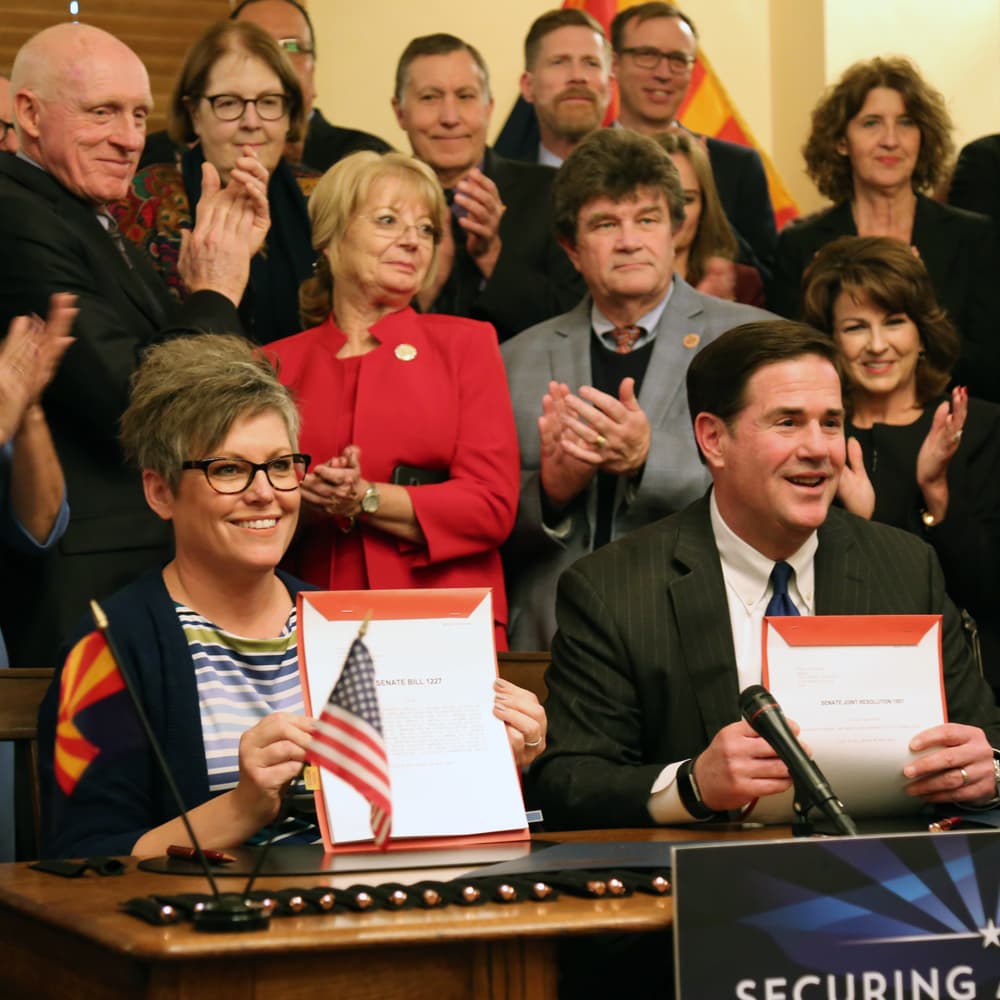AMWUA Blog
BY: Warren TenneyDCP: Milestone for Arizona But Now What?

Arizona took an important step on January 31 to protect its Colorado River water and maintain control of its future when the Governor signed legislation approving the State’s participation in the Lower Basin Drought Contingency Plan (DCP). In doing so, Arizona proved to itself and fellow Colorado River basin states, that it still has what it takes to hammer out a hard-fought compromise that ultimately protects the State’s collective interests.
DCP is a plan negotiated by the seven Colorado River basin states to take less water from Lake Mead over the next seven years to prevent the lake from falling to catastrophic levels. Before agreeing to sign the interstate DCP, the State had to also agree to a plan for how DCP would be implemented in Arizona. After months of difficult negotiations, a carefully crafted implementation plan, that addresses the major requirements of Arizona’s various water using stakeholders, was put together.
At a cost of more than $130 million, the majority of which is funded by you the taxpayers, the implementation plan will mitigate the impacts of DCP on Pinal County irrigation districts that will no longer receive Colorado River water under DCP shortages, and on Tribes and cities that rely on Non-Indian Agriculture (NIA) priority water, which would be reduced and later eliminated under DCP shortages. Importantly, this implementation plan ensures that Arizona leaves water in Lake Mead to help protect the Colorado River system from deeper shortages.
So why are we doing all of this?
The goal is to protect the Colorado River system by having Arizona, California, Nevada, and Mexico agree to voluntarily use less water to ensure Lake Mead levels do not plummet to dangerously low levels. Under DCP, Arizona will continue to take the largest share of cuts to its Colorado River water supplies because of the junior priority of the Central Arizona Project that moves a portion of the State's Colorado River water to central Arizona. California, for the first time ever, has agreed to take reductions when Lake Mead reaches lower levels, something it is not required to do given its water use seniority.
DCP will not prevent shortages, but it will significantly reduce the risk of far deeper shortages and greater uncertainty on the Colorado River system. For these reasons, the AMWUA cities support DCP and will contribute significantly to the implementation plan to reduce uncertainty with the delivery of our renewable Colorado River supplies.
What does DCP mean for residents and businesses in the Phoenix area?
The AMWUA cities' Colorado River water supplies will not be cut in the first-tier shortage under DCP. Our cities have planned for, and continue to prepare for, a drier future. We have robust water portfolios and infrastructure, along with a well-established conservation ethic which means we do not need to implement water restrictions at this time.
Now what?
Arizona has done its part by agreeing to sign DCP. The State is wrapping up the required agreements for the implementation plan. Now, California and the Federal Government must act to make DCP a reality. California needs to make certain two irrigation districts with Colorado River water priorities are on board with DCP. The U.S. Congress must pass legislation approving the Secretary of the Interior’s oversight of the DCP agreements. These steps must be done this summer, when the U.S. Bureau of Reclamation formally determines the shortage status of the Colorado River.
DCP bridges the gap to 2026 when the Colorado River basin states and U.S. Bureau of Reclamation will revisit how best to manage the Colorado River. With the reality that the River is over-allocated, all of the basin states must now come to grips with the need to take permanent reductions for the long-term health of the River.
As supplies get tighter, Arizona must resist attempts to dismantle or relax the high standard we set for ourselves with the 1980 Groundwater Management Act and 100-year Assured Water Supply requirements. We must staunchly protect these foundations of our State’s wise water management and thriving desert economy.
All Arizonans must play a role in improving how we use water . The AMWUA cities will continue to plan and prepare for a drier future. For four decades, we have met and exceeded the State’s conservation requirements. We will continue to seek opportunities to use water more efficiently because we know every drop counts.
But for now, let's acknowledge this significant landmark. DCP it is good reminder of what Arizona can accomplish when water users increase their understanding of each other's needs and accept the hydrologic reality we collectively face. The Governor, Legislature, Arizona Department of Water Resources, and Central Arizona Water Conservation District showed leadership to get this done. Hundreds of people, from Tribes to agricultural interests, from municipalities to business leaders, as well as many others worked long hours to protect our Colorado River water and find the best plan to minimize the impact of having less.
DCP is an important milestone, but the journey to protect and manage our water resources never ends.
For 50 years, Arizona Municipal Water Users Association has worked to protect our member cities’ ability to provide assured, safe and sustainable water supplies to their communities. For more water information visit www.amwua.org .
Stay up to date & sign up for the AMWUA Blog:
Sign Up Now For Email Marketing you can trust.
